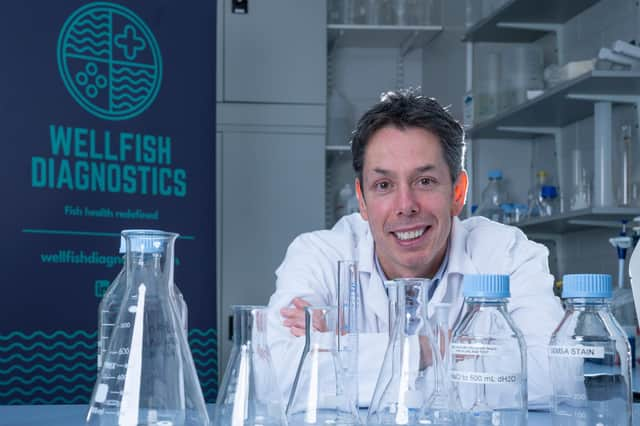Spin-out focused on improving fish health targets major global growth after netting funding boost


WellFish Diagnostics says it has developed the first non-lethal method for assessing fish health, and will benefit from a £1.2 million investment from the University, Kelvin Capital and Scottish Enterprise.
It explains that traditional fish health testing can take days to produce results and often requires lethal sampling, but the firm has established a method to enable fish farmers to continually monitor the health of their fish population via blood sampling, in a “unique” approach it has developed in conjunction with the salmon farming industry in Scotland.
Advertisement
Hide AdAdvertisement
Hide AdThe spin-out also says it has a huge target market, and it has plans for rapid, international growth, aiming to extend into Norway in 2022, and eyeing further expansion into South America and Canada by 2023.
WellFish notes that is working with the entire Scottish salmon sector, a large trout farm, and producers in Norway and Ireland to provide fish farmers with technology and training to take their own samples, which are then sent to WellFish for testing, with results provided within 24 hours. The company is the second to spin out from UWS, and is based in a “state-of-the-art” laboratory at its Paisley campus.
Chief executive Brian Quinn, a professor of ecotoxicology at the School of Health and Life Sciences at UWS, said: “WellFish presents a huge opportunity for the aquaculture sector to completely transform its practices for monitoring, responding to and predicting health challenges within the fish population.”
Professor Quinn, who is also a two-time Converge Challenge finalist and winner of the 2019 European Aquaculture Society Innovation Forum, added that the firm offers the first-ever laboratory to provide a non-lethal method of examining fish health commercially, enabling farmers to spot the early onsets of a potential health challenge, and take action to reduce the impact, such as choosing to change feeding regimes.
“Our company also enables farmers – and the wider aquaculture sector – to access our data and spot trends emerging over time, meaning we are also contributing directly to crucial knowledge transfer about fish health-management practices within the sector and beyond,” he also said.
Expertise
WellFish’s six-strong team includes aquaculture specialists Dr Graeme Dear, former MD at Marine Harvest Scotland and Skretting UK, as well as John Allan, former executive vice-president and chief technology officer of healthcare diagnostics company Quotient.
The Paisley-based firm is the result of an initial research-and-development project supported by the Sustainable Aquaculture Innovation Centre, the UK Seafood Innovation Fund, and Scottish Enterprise’s High Growth Spinout Programme.
Victoria Carmichael, director of growth investments at Scottish Enterprise, said: “WellFish typifies the truly ground-breaking research projects our High Growth Spinout Programme was established to support. Its testing methods have the potential to revolutionise not only Scotland’s salmon farming industry, but the processes used by progressive fish farmers all over the world.”
Advertisement
Hide AdAdvertisement
Hide AdJohn McNicol, director of Kelvin Capital, underlined how the salmon industry is worth around $15.4 billion (£11.7bn). WellFish “is perfectly placed to disrupt this vast market – and we are excited to be working with the team to help them achieve these goals,” he said.
A message from the Editor:
Thank you for reading this article. We're more reliant on your support than ever as the shift in consumer habits brought about by coronavirus impacts our advertisers.
If you haven't already, please consider supporting our trusted, fact-checked journalism by taking out a digital subscription.
Comments
Want to join the conversation? Please or to comment on this article.
